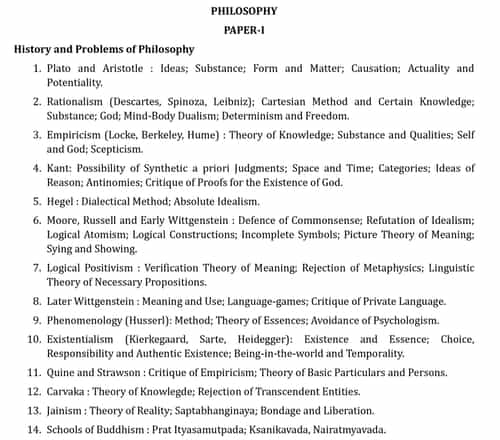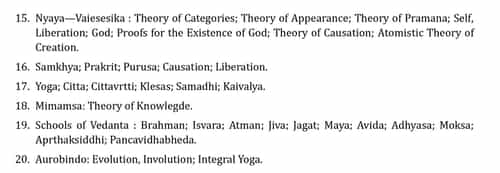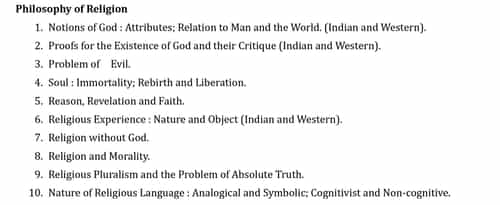Philosophy Optional Syllabus – Download UPSC Philosophy Syllabus PDF
By BYJU'S Exam Prep
Updated on: November 14th, 2023
The Philosophy Optional Syllabus of UPSC is focused on the topics and problems related to the evolution and history of philosophy and its influence on the culture of India. Philosophy Optional is a popular subject as a chunk of it overlaps with other general studies and essay papers. In addition, the UPSC Philosophy Optional Syllabus is static in nature, so the candidates don’t have to prepare for the current affairs section for this subject.
Furthermore, the Philosophy Syllabus for UPSC is concise, and resources are easily available for preparation. However, the candidates must have a firm grip on the Philosophy Optional Syllabus to develop an effective preparation strategy and score exceptionally well in the exam.
Table of content
Philosophy Optional Syllabus
The topics included in the UPSC Philosophy Optional Syllabus should be prepared thoroughly by studying UPSC question papers and reading from relevant books. The candidates can also integrate their preparation for the Philosophy UPSC syllabus and the General studies of mains as there are some common topics between them. Check out the philosophy syllabus for both paper 1 and paper 2 below, and shape your preparation accordingly. There will be two papers in the philosophy subject, Paper 1, and Paper 2. Each paper will be 250 marks, and a total of 500 marks. By getting acquainted with the topics of the syllabus the candidates can enhance their level of UPSC preparation strategy.
| Philosophy Syllabus for UPSC | Topics |
| Philosophy UPSC Syllabus Paper 1 | History and Problems of Philosophy |
| UPSC Philosophy Syllabus Paper 2 | Socio-Political Philosophy and Philosophy of Religion |
Philosophy Optional Syllabus PDF
Candidates can download the UPSC Philosophy Syllabus from the link given below, and take a printout of it to ensure every topic is covered properly. The candidates can download the Philosophy syllabus PDF which will aid them in covering the UPSC syllabus effectively.
Philosophy Syllabus for UPSC PDF
The Philosophy Optional Syllabus contains all the topics that are to be completed for the mains exam. Aspirants preparing in Hindi medium can also download UPSC Philosophy Syllabus in Hindi PDF.
UPSC Philosophy Optional Syllabus Paper 1
Paper 1 of the Philosophy Optional Syllabus focuses on the history and problems of philosophy, divided into subtopics. UPSC Philosophy Syllabus for paper 1 include topics related to thinkers such as Plato, Kant, etc. Apt and accurate utilization of the UPSC study material will enable the candidates in preparing effectively for the exam.


Philosophy Syllabus for UPSC Paper 2
Two major topics included in paper 2 of the Philosophy UPSC Syllabus are socio-political Philosophy and the philosophy of religion. Detailed knowledge of the core concepts and fundamentals of the philosophy will enable the candidates in performing well in the upcoming exam. This is an important and eminent segment of the UPSC mains and pushes the candidates toward achieving the desired position in the recruitment process.
Socio-Political Philosophy UPSC Syllabus
It is advised to the aspirants to pick their optional subjects after taking a look at the syllabus. This highly impacts the performance of the candidates. This is a part of paper 2 of IAS Philosophy optional. The candidates can prepare for UPSC from zero level, if they have a methodical and efficient preparation strategy.
- Social and Political Ideals: Equality, Justice, Liberty.
- Sovereignty: Austin, Bodin, Laski, Kautilya.
- Individual and State: Rights; Duties and Accountability
- Forms of Government: Theocracy, Monarchy, and Democracy.
- Political Ideologies: Anarchism; Marxism and Socialism
- Humanism; Secularism; Multiculturalism.
- Crime and Punishment: Corruption, Mass Violence, Genocide, Capital Punishment.
- Development and Social Progress.
- Gender Discrimination: Female Foeticide, Land, and Property Rights; Women Empowerment.
- Caste Discrimination: Gandhi and Ambedkar

How to Prepare Philosophy Optional Syllabus?
The UPSC Philosophy Optional Syllabus is divided into four parts namely Indian Philosophy, Western Philosophy, Religious Philosophy, and Social-Political Philosophy. We have prepared a preparation strategy for each part. The candidates can refer to the preparation strategy adopted by the UPSC toppers in order to succeed and score good marks.
- Indian Philosophy and Western Philosophy: Both these topics are included in GS paper 1 syllabus of the UPSC philosophy syllabus. Following good books, and online resources would be helpful while preparing for this topic.
- Social-Political Philosophy and Religious Philosophy: For preparing these topics, candidates need to refer to the Hindu editorials and articles from monthly magazines.
- Practicing UPSC mains answer writing, and preparing notes for this subject would be a good addition to the preparation.
- Refer to the answer of toppers and get a point of view of how the answers should be constructed.
Important Topics of Philosophy Optional Syllabus
The candidates must be in possession of an in-depth knowledge of all the core concepts of the UPSC optional subjects. However, the essential topics can be marked by the candidates and prioritized while preparing for the IAS exam. The list of the essential segments of the Philosophy optional syllabus has been mentioned here-
- Social and Political Ideals
- Sovereignty
- Crime and Punishment
- Gender Discrimination
Best Books for UPSC Philosophy Syllabus
Apart from strategic preparation, following good books is highly essential. The candidates can check the IAS topper optional subject and check their preparation strategy to get a complete idea of preparation. Some of the highly recommended books to cover the UPSC philosophy syllabus are:
- An Introduction to Indian Philosophy by Satishchandra Chatterjee.
- Contemporary Indian Philosophy by Basant Kumar Lal.
- An Introduction to Political Theory by O.P. Gauba.
- Philosophy of Religion by John H Hick.
- A Critical History of Western Philosophy: Greek, Medieval and Modern by Yakub Masih.
- A Critical Survey of Indian Philosophy by Chandradhar Sharma.
Other optional subject syllabi apart from UPSC Philosophy Optional Syllabus are given below. If you are still deciding on the optional subject for UPSC, download the syllabus and comprehensively go through the topics.
